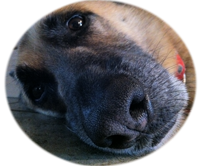Potty Training Info
Successful potty training requires attentiveness and patience. With positive training, your dog will be able to identify the area where he has been trained to do his thing. Potty should be a good experience for your pup. Shape his behavior with encouragement and reward, not punishment.
- Accidents will happen. If an accident happens, it is not puppy’s fault, just be more attentive. Avoid shouting or cursing your dog because it will not produce the desired response, and can harm your relationship.
When to Begin House Training
Early training helps establish good habits for later when puppy develops muscle control. By about 12 weeks old a puppy has some control of his bladder and bowel movements and starts to be able to hold it. It is unfair to crate a pup longer than he is physically able to control himself. In those cases, confine him to a small room with bedding and water on one side, and potty pad/newspaper on the other.
* It may take several months for puppy to be fully housetrained. Don’t worry if there are setbacks. As long as you continue a program that includes taking puppy out at the first sign he needs to go and offering rewards, he’ll learn.
Steps to follow:
- Keep puppy in a defined space, such as a crate, exercise-pen, a room, or on a leash. As your puppy learns to go outside to do his business, you can gradually give him more freedom to roam about the house.
- Keep the puppy on a regular feeding schedule and take away food between meals.
- Take puppy out to potty often: first thing in the morning and then approximately every hour or so during training. Always take him outside after meals, when he wakes from a nap, and during playtime (pups will potty more often during play). Make sure he goes out last thing at night and before he’s left alone.
- Take puppy to the same spot each time to do his business. His scent will prompt him to go, and helps establish an acceptable bathroom spot for puppy to eliminate.
- Stay with him outside until puppy eliminates until he’s fully housetrained. Praise him and give him a treat!
- Remember, dogs can have so much fun when playing they forget to do their thing in the proper area so bring your dog to the designated potty area even while playing, and before going back inside.
Signs That Say Your Puppy Needs to Eliminate
Whining, circling, sniffing, barking, or staring at the door are signs he needs to go. Take him out right away.
Dos and Don’ts
- Punishing your puppy for having an accident is a definite no-no.
- If you catch puppy in the act, clap so he knows he’s done something unacceptable, but don’t scare him. Take him out gently, and when he’s finished, praise and reward. Potty should be a positive experience.
- If you found the evidence but didn’t see the act, don’t react by yelling, hitting or rubbing his nose in it. Puppies aren’t intellectually able to connect your anger with their accident; anger will harm your bond.
- Staying outside longer with puppy may help to curb accidents. He may need the extra time to explore.
- Clean up accidents with an enzymatic cleanser to minimize odors that might attract the puppy.
Using a Crate
A crate can be a good idea for house-training your puppy (see crate training info)
- Make sure it is large enough for the puppy to stand, turn around, and lie down comfortably, but not big enough for him to use a corner as a bathroom.
- Make sure the crate is a happy place; never force or use a crate for punishment. Put treats and toys in crate.
- If you are using the crate for more than two hours at a time, make sure puppy has fresh water, preferably in a no-spill bowl or dispenser you attach to the crate.
- If you can’t be home during the house-training period, make sure somebody else gives him breaks during the day for at least the first 9 months.
- Don’t use a crate if puppy is eliminating in it. Eliminating in the crate could have several meanings: he may not be getting outside often enough; or he may be too young to hold it in for that length of time.
